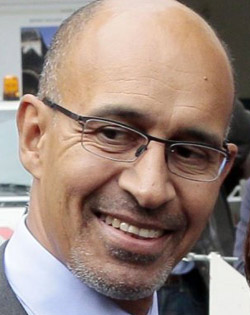Harlem Désir, France’s First Black President?
Joseph Bamat, France 24, October 19, 2012
France’s ruling Socialist Party has officially appointed Harlem Désir as its new leader, a move that potentially puts the former anti-racism activist on track to becoming the country’s first black president.
Members of France’s ruling Socialist Party overwhelmingly picked Harlem Désir as party chief during the group’s congress in the southwest city of Toulouse on Thursday. The vote made Désir the first black man to lead a major political party in France, placing him on a political fast track to the French presidency.
The outcome of the vote came as no surprise. Désir, 52, has served as interim party chief ever since Lille city mayor Martine Aubry stepped down in June 2011 to take part in presidential primaries. Aubry resigned from her post last month, all but naming Désir as her successor.
While there is no guarantee the Socialist Party (PS) will also pick Désir as a presidential nominee one day, recent history suggests he can now aspire to the country’s top job.
French President François Hollande was the leader of the PS from 1997 to 2008, and François Mitterrand — the only other Socialist president in recent history — was party chief from 1971 to 1981.
Hollande’s five-year mandate has only started, and tradition suggests that the French president will aspire for a second term in 2017. Therefore, it is likely that Désir’s earliest opportunity to run for the presidency would come in 2022.
But his new prominent position on the national stage nevertheless raises the question: is France witnessing the making of its first black head of state?
Activist turned politician
The son of a black father from the French overseas department of Martinique and a white mother from Alsace, near the German border, Harlem Jean-Philippe Désir was born in Paris in 1959. He rose to national prominence in the 1980s as one of the hip young leaders of the popular backlash against the then-surging far-right National Front. A philosopher by training, the activist Désir would go on to lead prominent racism watchdog SOS Racisme.
According to Michel Wieviorka, a French sociologist who has studied racism in France and is close to former Socialist leader Aubry, Désir is one of only a handful of political figures in France to come from the advocacy world — and the label has stuck. “His name continues to be associated with SOS Racisme,” Wieviorka noted, even though Désir left the group two decades ago.
From 1992, Désir tried to make a name for himself in politics, but did not immediately turn to the Socialist Party. After short-lived stints with ecologically-minded political groups, he eventually joined the Socialist camp in 1994.
Within five years, he had won a seat in the European parliament, a position he has held ever since, earning legitimacy as a lawmaker but gaining little visibility among the French public. His big break came only last year, after he stepped up to take over Aubry’s job and organised the widely successful Socialist primaries.
Troubles with the law
There have also been bumps in Desir’s promising path to power, and if he ever makes a bid for the presidency he will have to answer for past mistakes. In 1998, he was given an 18-month suspended prison sentence and ordered to pay more than 4,500 euros for collecting a paycheck for a non-existent job.
He also owed the French treasury around 12,000 euros in traffic fines before Mitterrand granted him an amnesty in 1992.
Désir has also earned criticism for progressively shedding his political convictions and outspoken character to mould himself into an unquestioning subordinate of the party.
He is often further derided for his prepared statements and a lack of sincerity when answering questions by the French press, who bestowed him with the unbecoming “mealy-mouthed” award during a PS gathering in La Rochelle in August.
“You can’t become the first secretary of the Socialist Party without making some sacrifices,” Malek Boutih, another former president of SOS Racisme, told FRANCE 24. “If Désir said everything he thought, he would never be where he is today.”
The French Obama?
While the list of detractors has grown, it is certain Désir has worked his way into the right company. “Harlem Désir has earned François Hollande’s trust, and the trust of all those who work closely with the president,” Wieviorka said, agreeing that the possibility he will one day become president was now in the “back of everyone’s minds”.
For Nicole Bacharan, a French-American historian and political analyst, there is no doubt Désir has the ambition to become president, even if it is impossible to predict the future direction the PS will take.
That ambition and Desir’s mixed-race background are certain to earn him comparisons to US President Barack Obama, who first stepped into the political spotlight during the 2004 Democratic National Congress in Boston, four years before his own successful election bid.
But Bacharan, who is also the co-author of Le guide des élections américaines (Guide to the American Elections, Perrin 2012), says France has “definitely not found its Obama yet.”
The scholar said the election of a black or mixed-race president in France would not carry the enormous historic symbolism that Obama’s victory had in the US in 2008. “France’s historical mistakes and trauma are connected less to the slave trade and more to war in North Africa,” she said.
Perhaps more importantly, Bacharan said Désir lacked the “exceptional” charisma that Obama first displayed in 2004. “Whatever you think about Obama now, when he gave his keynote speech everyone thought the same thing: ‘This is the guy’. Désir has shown he has talent, but has not shown he is exceptional.”
















